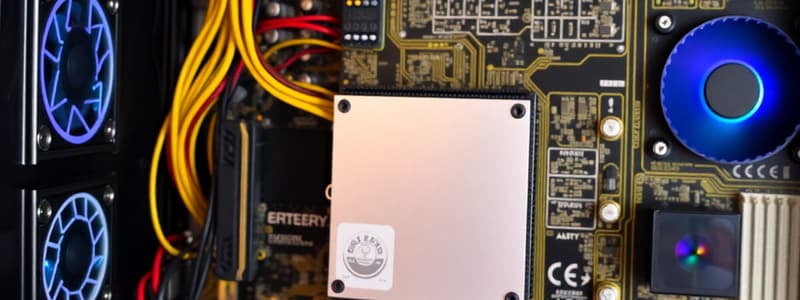Podcast
Questions and Answers
What is the primary goal of an operating system?
What is the primary goal of an operating system?
- To execute programs efficiently (correct)
- To hide hardware details from the user
- To manage computer hardware
- To create a user-friendly interface
Which of the following is NOT a component of a computer system?
Which of the following is NOT a component of a computer system?
- Networking Protocols (correct)
- User
- Application Programs
- Operating System
Who is considered the world’s first programmer?
Who is considered the world’s first programmer?
- Alan Turing
- Ada Lovelace (correct)
- John von Neumann
- Charles Babbage
What technology characterized the first generation of operating systems?
What technology characterized the first generation of operating systems?
Which of these is a secondary goal of operating systems?
Which of these is a secondary goal of operating systems?
What type of resources does the operating system manage?
What type of resources does the operating system manage?
Which operating system is known for its reliability in server environments?
Which operating system is known for its reliability in server environments?
What is created by an operating system to abstract hardware details from users?
What is created by an operating system to abstract hardware details from users?
What was a significant change introduced in the computing process during the early 1950s?
What was a significant change introduced in the computing process during the early 1950s?
How did the introduction of transistors in the mid-1950s impact the functionality of computers?
How did the introduction of transistors in the mid-1950s impact the functionality of computers?
During which period did computers start to be used for multiprogramming?
During which period did computers start to be used for multiprogramming?
What was a primary disadvantage of the batch processing system used in the early computing era?
What was a primary disadvantage of the batch processing system used in the early computing era?
What led to the evolution of personal computers in the 1980s?
What led to the evolution of personal computers in the 1980s?
What was a characteristic of computers referred to as mainframes?
What was a characteristic of computers referred to as mainframes?
Which programming languages were commonly used during the early programming era for writing jobs?
Which programming languages were commonly used during the early programming era for writing jobs?
What was a direct result of batch processing systems improving during the 1960s?
What was a direct result of batch processing systems improving during the 1960s?
Flashcards are hidden until you start studying
Study Notes
Introduction to Operating Systems
- An operating system (OS) acts as an intermediary between a user and the computer hardware.
- The OS provides an environment for users to execute programs.
- The main goal of an OS is to make the computer system convenient to use.
- A secondary goal is to efficiently use the computer hardware.
Computer System Components
- Hardware provides fundamental computing resources such as the CPU, memory, and I/O devices.
- The OS controls and coordinates the hardware utilization by application programs.
- Application programs solve computing problems for users (e.g., compilers, database systems, video games, banking software).
- Users can be people, machines, or other computers.
Objectives of Operating Systems
- To hide hardware details through abstraction.
- To allocate resources to processes and manage resources.
- To provide a pleasant and effective user interface.
History of Operating Systems
- Charles Babbage designed the first true digital computer, the "Analytical Engine."
- Ada Lovelace, hired by Babbage, became the world's first programmer.
- The programming language Ada is named after her.
First Generation: Vacuum Tubes and Plug Boards
- First computers used mechanical relays and were exceptionally slow, with cycle times measured in seconds.
- Vacuum tubes replaced relays, leading to larger machines, but still very slow compared to modern personal computers.
- Punched cards were introduced in the early 1950s, allowing programs to be written and read on cards instead of plug boards.
Second Generation Transistors and Batch System (1955 – 1965)
- The introduction of transistors significantly improved computer reliability and led to the production of mainframes sold to paying customers.
- Mainframes required specialized air-conditioned computer rooms and professional operators.
- Programmers would write programs on paper (in FORTRAN or assembler), punch them onto cards, and hand them to an operator for processing.
- Input and output were handled manually, resulting in wasted computer time during operator movement.
Third Generation ICs and Multiprogramming (1965 – 1980)
- Batch processing systems were able to run multiple jobs at once, making better use of computer resources.
Fourth Generation Personal Computers (1980 – Present)
- The development of large-scale integration (LSI) circuits, or chips, ushered in the era of personal computers and workstations.
- Microprocessor technology progressed rapidly, allowing desktop computers to become as powerful as the mainframes of the 1970s.
Studying That Suits You
Use AI to generate personalized quizzes and flashcards to suit your learning preferences.




